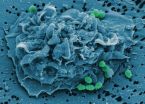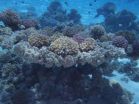(Press-News.org) At least one-third of the species that inhabit the world's oceans may remain completely unknown to science. That's despite the fact that more species have been described in the last decade than in any previous one, according to a report published online on November 15 in the Cell Press publication Current Biology that details the first comprehensive register of marine species of the world—a massive collaborative undertaking by hundreds of experts around the globe.
The researchers estimate that the ocean may be home to as many as one million species in all—likely not more. About 226,000 of those species have so far been described. There are another 65,000 species awaiting description in specimen collections.
"For the first time, we can provide a very detailed overview of species richness, partitioned among all major marine groups. It is the state of the art of what we know—and perhaps do not know—about life in the ocean," says Ward Appeltans of the Intergovernmental Oceanographic Commission (IOC) of UNESCO.
The findings provide a reference point for conservation efforts and estimates of extinction rates, the researchers say. They expect that the vast majority of unknown species—composed disproportionately of smaller crustaceans, molluscs, worms, and sponges—will be found this century.
Earlier estimates of ocean diversity had relied on expert polls based on extrapolations from past rates of species descriptions and other measures. Those estimates varied widely, suffering because there was no global catalog of marine species.
Appeltans and colleagues including Mark Costello from the University of Auckland have now built such an inventory. The World Register of Marine Species (WoRMS) is an open-access, online database (see http://www.marinespecies.org/) created by 270 experts representing 146 institutions and 32 countries. It is now 95% complete and is continually being updated as new species are discovered.
"Building this was not as simple as it should be, because there has not been any formal way to register species," Costello says.
A particular problem is the occurrence of multiple descriptions and names for the same species—so called "synonyms," Costello says. For instance, each whale or dolphin has on average 14 different scientific names.
As those synonyms are discovered through careful examination of records and specimens, the researchers expect perhaps 40,000 "species" to be struck from the list. But such losses will probably be made up as DNA evidence reveals overlooked "cryptic" species.
While fewer species live in the ocean than on land, marine life represents much older evolutionary lineages that are fundamental to our understanding of life on Earth, Appeltans says. And, in some sense, WoRMS is only the start.
"This database provides an example of how other biologists could similarly collaborate to collectively produce an inventory of all life on Earth," Appeltans says.
###
Appeltans et al.: "The Magnitude of Global Marine Species Diversity"
At least one-third of marine species remain undescribed
2012-11-15
ELSE PRESS RELEASES FROM THIS DATE:
Surprising genetic link between kidney defects and neurodevelopmental disorders in kids
2012-11-15
New York, NY (November 15, 2012) — About 10 percent of kids born with kidney defects have large alterations in their genomes known to be linked with neurodevelopmental delay and mental illness, a new study by Columbia University Medical Center (CUMC) researchers has shown.
The study was published today in the online edition of the American Journal of Human Genetics.
Congenital defects of the kidney and urinary tract account for nearly 25 percent of all birth defects in the US and are present in about 1 in every 200 births. Eventually, an evaluation for genomic alterations ...
Appetite suppressant for scavenger cells
2012-11-15
This press release is available in German.
When infected with influenza, the body becomes an easy target for bacteria. The flu virus alters the host's immune system and compromises its capacity to effectively fight off bacterial infections. Now, a team of immunologists at the Helmholtz Centre for Infection Research (HZI) and cooperation partners has discovered that an immune system molecule called TLR7 is partly to blame. The molecule recognizes the viral genome – and then signals scavenger cells of the immune system to ingest fewer bacteria. The researchers published ...
This is your brain on freestyle rap
2012-11-15
Researchers in the voice, speech, and language branch of the National Institute on Deafness and Other Communication Disorders (NIDCD) at the National Institutes of Health (NIH) have used functional magnetic resonance imaging to study the brain activity of rappers when they are "freestyling" – spontaneously improvising lyrics in real time. The findings, published online in the November 15 issue of the journal Scientific Reports, reveal that this form of vocal improvisation is associated with a unique functional reallocation of brain activity in the prefrontal cortex and ...
About one million species inhabit the ocean
2012-11-15
Every taxonomist has calculated the number of existing species within their specialty and estimated the number that remain to be discovered, both through statistical models as based on the experience of each expert. According to Enrique Macpherson, researcher at the Center for Advanced Studies of Blanes (CEAB-CSIC, Spain), who has participated in the study: "Bringing together the leading taxonomists around the world to pool their information has been the great merit of this research".
The statistical prediction is based on the rate of description for new species in recent ...
Penn study decodes molecular mechanisms underlying stem cell reprogramming
2012-11-15
PHILADELPHIA – Fifty years ago, British researcher John Gurdon demonstrated that genetic material from non-reproductive, or somatic, cells could be reprogrammed into an embryonic state when transferred into an egg. In 2006, Kyoto University researcher Shinya Yamanaka expanded on those findings by expressing four proteins in mouse somatic cells to rewind their genetic clocks, converting them into embryonic-like stem cells called induced pluripotent stem cells, or iPS cells.
In early October, Gurdon and Yamanaka were awarded the 2012 Nobel Prize in Physiology or Medicine ...
Early 50s may be key time to reach baby boomers with health messages
2012-11-15
COLUMBUS, Ohio -- For baby boomers, the peak interest in health issues comes at about age 51, with a second peak coming near age 65, according to a new study.
The results may help doctors and other professionals target this generation with health messages at a time when they are most receptive to hearing them, the researchers said.
The study, based on a survey of Americans age 45 to 65, showed that people in their late 40s had the lowest levels of interest in health issues. Interest rose quickly, however, and peaked in the early 50s, then dropped slightly and plateaued ...
Feinstein Institute researchers discover plant derivative
2012-11-15
MANHASSET, NY – Researchers at The Feinstein Institute for Medical Research have discovered that tanshinones, which come from the plant Danshen and are highly valued in Chinese traditional medicine, protect against the life-threatening condition sepsis. The findings are published in the December issue of Biochemical Pharmacology.
Inflammation is necessary for maintaining good health – without inflammation, wounds and infections would never heal. However, persistent and constant inflammation can damage tissue and organs, and lead to diseases such as sepsis. Sepsis affects ...
Researchers tap into CO2 storage potential of mine waste
2012-11-15
VANCOUVER, CANADA, NOVEMBER 15, 2012 -- It's time to economically value the greenhouse gas-trapping potential of mine waste and start making money from it, says mining engineer and geologist Michael Hitch of the University of British Columbia (UBC).
Hitch studies the value of mine waste rock for its CO2-sequestration potential, or "SP." He says mining companies across Canada will, in future, be able to offset CO2 emissions with so-named "SP rock," and within 25 years could even be selling emissions credits.
Digging, trucking and processing make mining an energy-intensive ...
Eating more fish could reduce postpartum depression
2012-11-15
Low levels of omega-3 may be behind postpartum depression, according to a review lead by Gabriel Shapiro of the University of Montreal and the Research Centre at the Sainte-Justine Mother and Child Hospital. Women are at the highest risk of depression during their childbearing years, and the birth of a child may trigger a depressive episode in vulnerable women. Postpartum depression is associated with diminished maternal health as well as developmental and health problems for her child. "The literature shows that there could be a link between pregnancy, omega-3 and the ...
Family commitment blended with strong religion dampens civic participation, Baylor researcher finds
2012-11-15
Blending religion with familism — a strong commitment to lifelong marriage and childbearing — dampens secular civic participation, according to research by a Baylor University sociologist.
"Strong family and strong religion. What happens when they meet? Is that good for the larger society? It is not always as it seems," said Young-Il Kim, Ph.D., Postdoctoral Fellow in Baylor's Institute for Studies of Religion.
His study — "Bonding alone: Familism, religion and secular civic participation" — is published online in Social Science Research. The findings are based on analysis ...


